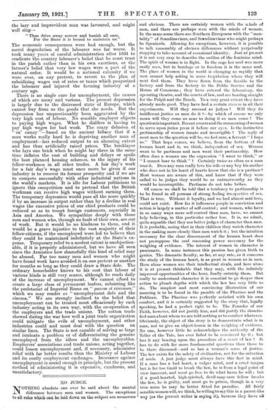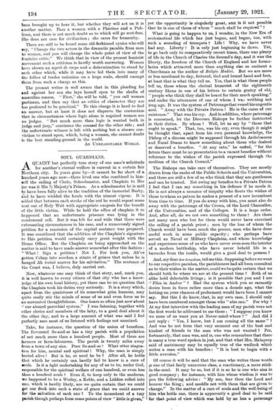NO JUDGE. N OTHING absolute can ever be said about the
mental difference between men and women. The exceptions to all rules which can be laid down on the subject are numerous and obvious. There are certainly women with the minds of men, and there are perhaps men with the minds of women. In the same sense there are Southern Europeans with the "men- tality" of Scandinavians, and Scandinavians who might perhaps be Spaniards. Allowing for exceptions, however, it is possible to talk reasonably of obvious differences without perpetually stopping to take account of occasional identity. Just at present it is not very easy to describe the outline of the feminine mind. The spirit of woman is in flight. In the cage her soul was more easily seen, but in bondage or in freedom it is the same soul. The place of women in the world is changing so rapidly that men cannot help asking in some trepidation where they will next find them. They have flown from the fireside to the factory and from the factory to the Public Service and the House of Commons ; they have entered the laboratory, the operating theatre, and the courts of law, and are heading straight for the Pulpit and the Bench. To a very great extent they have already made good. They have had a certain success in all their experiments. Will they succeed as judges ? Will they do indifferent justice as men do it ?—by which of course we only mean will they come as near to doing it as men come ? Tho question is important. Recent events and the summoning of women to serve upon juries press it before our eyes. Is the instinctive partisanship of women innate and incorrigible ? The reply of most men to the question will be, we feel sure, a fervent " I hope so." That hope comes, we believe, from the bottom of the human heart and is, we think, independent of sex. Women want to be partisans and men want their partisanship. How often does a woman use the expression " I want to think," or " I cannot bear to think " ? Certainly twice as often as a man uses it. Does any man really love his wife or any boy his mother who does not in his heart of hearts know that she is a partisan? Most women are aware of this, and know that if they were called to be judges they would be as untrustworthy as they would be incorruptible. Partisans do not take bribes.
Of course we shall be told that a tendency to partisanship is to be found in all persons of strong feeling irrespective of sex. That is true. Without it loyalty, and we had almost said love, could not exist. How far it influences people in conviction and action is largely a matter of self-control ; and women, who have in so many ways more self-control than men, have, we cannot help believing, in this particular rather less. It is, we admit, quite arguable that they are better judges of character than men. It is probable, seeing that in their children they watch character in the making more closely than men watch it ; but the intuition necessary for the clear discernment of the human heart does not presuppose the cool reasoning power necessary for the weighing of evidence. The interest of women in character is passionate. In some instances this passion has given birth to genius. The dramatic faculty, so far, at any rate, as it concerns the study of the human heart, is as great in women as in men. Here alone women are their intellectual rivals, and here alone it is at present thinkable that they may, with the infinitely improved opportunities of the hour, finally outstrip them. But really to understand character it is essential to go deeper than action to plumb depths with which the law has very little to do. The simplest and most convincing illustration of our meaning is to be found in the parable of the Pharisee and the Publican. The Pharisee was perfectly satisfied with his own conduct, and it is certainly suggested by the story that, legally speaking, he had a perfect right to be. The Founder of our Faith, however, did not justify him, and did justify the dissatis- fied man about whom we are told nothing as to conduct whatever. Obviously, the object of the story is to demonstrate what is in man, not to give an object-lesson in the weighing of evidence. No one, however little he acknowledges the authority of the Teller of the Tale, has ever failed to be convinced by it ; but has it any bearing upon the procedure of a court of law ? It has to do with far more fundamental questions than those to be there discussed—and so has a woman's sense of justice. The law exists for the safety of civilization, not for the salvation of souls. A just judge must always have this fact in mind. If a man has a bad heart, a vulgar mind, and a cruel tongue but is far too timid to break the law, he is from a legal point of view innocent, and must go free to do what harm he will ; but if a good-hearted, high-spirited, devil-may-care fellow breaks the law, he is guilty, and must go to prison, though in a very true sense he may be better fitted for paradise. All fairly sensible women will, we think, be willing to say this in a parrot-like way (as the present writer is saying it), because they have all
been brought up to hear it, but whether they will act on it is another matter. Face a woman with a Pharisee and a Pub- lican, and there is not much doubt as to which will go scot-free. She does not care for civilization ; she cares for humanity.
There are still to be found some old-fashioned cynics who will say, " Change the two actors in the dramatic parable from men to women, and you will change the whole point of view of the feminine critic." We think that in view of the present feminist movement such a criticism is hardly worth answering. Women have shown an esprit de corps and a determination to stand by each other which, while it may have led thein into many of the follies of trades unionism on a huge scale, should exempt them from such a charge as this.
The present writer is well aware that in this pleading for and against her sex she lays herself open to the shafts of masculine reason. " First," she will be told, " you call women partisans, and then say that as critics of character they are too profound to be practical." To this charge it is hard to find an answer, but at least it does not disprove the contention that in circumstances where logic alone is required women are no judges. " But much more than logic is wanted both in judge and jury," continues the counsel for the other side ; and the unfortunate witness is left with nothing but a sincere con- viction to stand upon, which, being a woman, she cannot doubt is the best standing-ground in the world.
AN UNREASONABLE WOMAN.



































 Previous page
Previous page